- Home
- A. S. Byatt
The Virgin in the Garden Page 6
The Virgin in the Garden Read online
Page 6
He whipped away a torn newspaper and arranged her in a hollow, back against a tree. With his left arm round her, he began to undo her clothes with his right. She put a hand on his thigh.
“I always imagine rows of grinning boys will bob up out of the brambles. This wood always feels full of boys. Nosing things out …”
“You’re obsessed by boys.”
“I know. It’s awful. It never occurred to me I was going to loathe them. Poor little Thomas will grow up into one. I’m not having him on a scholarship at the School and ostracised like little Potter …”
“Is he?”
He had undone macintosh and cardigan. He turned these back, and started on the skirt.
“Yes, he is. He’s never with anyone. I think there’s something wrong with him. I saw him the other day running up and down like a rabbit, in all directions, for no reason, all alone in Far Field. Then lying down.”
Alexander laid bare her throat and breast. He made a folded frame of her clothing: she sat, still as a statue; he sighed and laid his face on hers. She shivered.
“Alexander – do you like boys?”
“Hush.”
“No, but do you?”
“Are you suspecting me of being queer? All wives suspect all unmarried masters of being queer.” He moved his face contentedly against the skin he’d bared. “No, I like them to teach, not to touch. I’ve never wanted to make a grab at one, or anything.”
He thought, his head comfortable on her breast, that he’d never been quite overwhelmed by desire to touch anyone. There had never been an occasion when he couldn’t almost as well not have touched. What he wanted, what he really wanted … could not be said. He said instead, “Why am I so happy? When I should feel unbearably frustrated.”
“Yes. You should. Why don’t you?”
“If I had a place – a bed – you don’t think I’d hesitate …”
“I don’t know if you would or not. It doesn’t look as if I’m ever going to find out.”
These expressions of aggression and discontent were also a ritual bent of their dialogue. She sat quite still. Alexander turned his attention to her thighs. He touched the cool and solid flesh between the slippery, straining stocking and the gripping rim of the roll-on. He ran delicate finger-tips over bumps of suspenders, ridges of elastic. He moved spread fingers inside the cutting edge of the pants to the warm creases and wiry hairs, the soft. She sighed, leaned back, put a hand on him. Don’t move, don’t move a muscle, he begged her in his head, fluttering his silent fingers. Bodies in clothes amazed him, the criss-crossing layers, the varieties of smooth, solid, tugging, fluid … There must be as many ways of making love as there are people: what he liked was a slow intensification as close as possible to immobility. It would have been perfectly possible to take her there in the wood. Under a coat or blanket the risks of action, in terms of discovery, were hardly greater than the risks of what they were now doing. He believed his reluctance to be aesthetic. Forcing her, amongst twisted and knotted clothing, smashed twigs, adhesive beech mast, different kinds of damp. So rudely forced. It was odd that although he suspected the lady would be willing he persistently thought in terms of forcing. No doubt he was a little odd. He must live with himself. He continued to flutter her with his hands to keep her still and open, and thought, as he often thought in this position, of T. S. Eliot. The inviolable voice. Philomel by the barbarous king so rudely forced. And still she cried and still the world pursues. The tenses. It was all very well struggling with Shakespeare, but the other voice was nearer and more insidious. He had a moment of panic. He would never have a voice of his own. There was a line he had thought was his, or at least his with a clever modern-Renaissance echo of Ovid, which he must change, he must remember to change, the damned cadence was certainly Eliot’s …
Jennifer spoke a run of words into his thought.
“Darling Alexander, I’ve got to, I simply must, go back to Thomas, and my bottom’s gone numb, too –”
He remarked that his own hip was dead or dying and his supporting wrist very painful. He looked at Jenny. There were large tears in her eyes. Silently he took out his handkerchief and gently wiped them up.
“Is anything wrong?”
“No. Only everything. I love you.”
“I love you.”
He tidied her, shutting away the white breasts, primly buttoning shirt, cardigan, raincoat, twisting a stocking-seam, brushing down skirts. They took out diaries, arranged to meet again, promised to write. Then, as she did always, she set out almost at a run, not looking back. He always gave her fifteen minutes start.
He sat back in the dead leaves composing a sentence of a yet-unwritten letter that would somehow weave the frailties of numb and cramped bodies into the sense he had of infinite golden time and space. She left such warmth behind her. He felt possessed by her. He smiled.
When he was a little boy, alone on Weymouth sands he had always had, or possibly been, so intense was her foamy presence, an imaginary girlfriend out of the sea, white and gold and clean and shining like Ellie in The Water Babies. Some memory of this presence was behind his Elizabeth. Possibly he had wanted to be a woman. This felt like some rather remote observation about someone else. If it was right then it ought to have added some sort of energy, or force, to his play. Which was what mattered. He must check that pseudo-Eliot-pseudo-Ovidian line.
After the proper time he got up and strolled deliberately back to the Castle Mound. The male and female gangs had now amalgamated and were cooking things in cans over a twiggy bonfire. The girl in the scarlet snood was splayed backwards over the knees of the largest and grubbiest boy, her dress rucked up over her thighs. The three smaller girls were sitting crosslegged, staring intently, their observation obviously an essential part of whatever was going on. As Alexander came out of the dark they switched their stares to him. The girl in the snood, wriggling with a movement as deliberate as a three-year-old’s automatic exposure of round belly and drooping pants to any male, arched her little crutch at him, quivering, waved a languid hand and made a loud, vulgar noise. Alexander felt the blood rise to his face and move under his hair. Worsted in some primitive test of audacity, he looked away, and hurried on.
4. Women in Love
The sisters sat by Stephanie’s electric fire in nightclothes. Stephanie was dripping, injecting milk into the increasingly bedraggled but still living kittens. She wore striped Marks and Spencer’s boys’ pyjamas, rather large, inside which her rounded body seemed formless and elusively bulky. Frederica affected a long white nightdress with full sleeves, and a yoke of broderie anglaise threaded with black ribbon. She liked to imagine this garment falling about her in folds of fine white lawn. It was in fact made of nylon, the only available kind of nightdress, except for vulgar shiny rayon, in Blesford or Calverley. It did not fall, it clung to Frederica’s stick-like and knobby limbs, and she disliked its slippery feel. She was always too easily seduced, when buying clothes, by some Platonic ideal garment possibly, though not necessarily, also envisaged by the makers of the cheap imitations she could afford to buy. She would have had a Yorkshire sense of quality in cloth if she’d had the money to go with it. Lacking money, she refused to be shrewd about the second-rate.
They talked about Alexander, and about their lives. There was no rivalry, only a curious complicity, about their love for him, probably because both in different ways were convinced that the love was hopeless. In Frederica’s case, the hopelessness was believed to be strictly temporary: she could not expect him to notice the glories of her mind and body just yet, since both of them were clouded by the repulsively constricting uniform, conventions and intellectual horizons of Blesford Girls’ Grammar. It is harder to know why Stephanie was so sure her love was hopeless. Alexander had watched her grow from girl to woman over five years and had never really seen her, so there was no reason to suppose he would suddenly do so. Her idea of him, which she enjoyed, was an idea of a man untouched, remote and pristine. This was part of
a symbolic view of Alexander held by both sisters, elaborated in talk, which was in itself another reason why they were so equable about sharing their passion. He stood for things they had not got, desired, and feared they would not have: art, as opposed to criticism of it, male mobility as opposed to female provincial rootedness, savoir-faire, the possibility of metropolitan glamour to come. He spent holidays, long ones, abroad: he had friends who were actors and dons in London and Oxford: unlike the other masters, he took flight for civilisation at the end of each term. Marriage was observably bad for masters, and worse for masters’ wives. If they loved him, they feared the awful effect on him of loving them, or anyone. The talk was an intensified version of earlier talk.
“He looked lovely tonight.”
“He dealt with the shouting so gracefully. He always does.”
“He won’t have to much longer. He’ll go. He’ll go, Steph, and leave us darkling.”
“I suppose so. I suppose he stayed so long, to be quiet, and finish the writing.”
“He talks to you about the writing. He doesn’t to me. I annoy him. I don’t mean to. I wish I didn’t.”
“Perhaps his play is really good.”
“Can you imagine what it might feel like, to be really good, and know it?”
“No. No, I can’t. Terrifying.”
“I mean, Steph, Shakespeare must have known he was different from other men …”
“He isn’t Shakespeare.”
“You don’t know.”
“I was only offering an opinion. Perhaps Shakespeare didn’t know.”
“He must’ve.” Privately, Frederica thought it a terrible strain to live with the knowledge that you were possessed of the force and scope of Frederica Potter, especially before you’d decided exactly where to apply this force. Alexander’s undoubted superiority didn’t seem to be essentially one of force. On the other hand …
“Your curate was very fierce, Steph.”
“Not my curate. But frighteningly fierce, yes. You should see him work.”
“I can’t see why most people just sit about so. I shan’t.”
“No, you won’t.”
“Why don’t you go away from here, Steph? You could.”
“I suppose I will. I’m just taking a little time to think.”
She bent her head over the kittens again, unwilling to contemplate that question.
“Go to bed, Frederica. I’ve got to be up all night, I need to doze a bit, go to bed, do.”
5. Daniel
When Daniel let himself into the Vicarage, it was dark outside, and there were no lights in the body of the house. It was not late, but the Vicar’s wife was sparing with heat and light, and the square Victorian stairwell was a mounting column of chill shadow. Daniel, who knew where he was, silently padded between the hazards of the coat-stand and the black oak chest, avoided the uncertainties of threadbare and fraying islands of Turkish runners, and made for the Vicar’s study.
Here were the ghosts of riches. A very heavy leather-topped desk, a pair of cut-glass, silver-lidded inkwells, a dark leather wing chair, walls of hide-bound books, behind glass. The Afghan carpet was threadbare in places, its black and gold shimmer worn away, where people trod, to an unreflecting sackcloth. The room was passionately cleaned, but there was a pervasive smell of narcissi, the lightly rich scent of freesia. In a shallow black china dish, with a faint silver sheen on the glaze, floated palely an artistic arrangement of cropped flower heads: cups of crimson and purple anemones, green-tipped snowdrops, as well as the papery narcissi and pale gold freesia, shadows of colour mirrored on the water.
They were put there by Miss Wells, daily, the Vicar’s devoted lodger, Stephanie’s senior colleague. Daniel disturbed her offering, reaching for the desk-light. He remembered that his mother had said it was dangerous to have flowers in a room at night. When his father had been lying dead she had shifted all the flower vases nightly into the scullery, packed them into the chipped, blood-red earthenware sink. They breathed out some poisonous gas, she said, the nurses in the hospital had told her. Daniel dismissed this memory. He reached for the Vicar’s library ladder and surveyed the bookshelves.
The complete Shakespeare, tooled in black and gold, was on the top shelf. The glass door was locked. Daniel surveyed the other doors. No key. Heavily he descended the ladder, searched the surface of the desk in the feeble circle of light, opened a silver box, tobacco-scented, a wooden coffer full of paper-clips and economy labels. He began, like a thief in the night, to rifle through the desk drawers, turning over little caches of coins, rubber bands, old woven Palm Sunday crosses. In a drawer within a drawer, worked by a secret spring in an upper pigeonhole, he found what he was looking for: the collection of keys on a gilt keyring which operated various household arcana, from the safe to the sewing-machine. He mounted his small ladder again, breathing heavily, swung back the door, and, after some peering at gilded letters in the gloom, reached down King Lear. The concave trough of pages was deep with dust: Daniel blew out a fine cloud of it, watched it disperse and fall, spoiled a handkerchief with black smudges. He closed case, drawer, desk, study softly behind him, and went on upwards.
His room was on the first floor. It was vast and cavernous, with a high moulded ceiling, bulging with swags of dust-darkened roses and white plaster apples stained onion-skin gold by creeping damp; there were two high windows still hung with the Ellenby’s war-time blackout curtains, black and gold cotton-rayon twist, with a raised pattern of large gold links. This room, inhabited by all Mr Ellenby’s curates, was described as a bed-sitting room: it had a hard little divan in one corner and a curtained alcove in which was a washbasin and a Baby Belling stove on which Daniel was expected to make himself cups of Nescafé and cook his own evening meal. (Breakfast and lunch he was expected to eat with the Ellenbys.) It was at once over- and underfurnished, both cluttered and bleak, like a furniture store. There was a real sense in which it was a furniture store: Mrs Ellenby’s natural course was to relegate to the bed-sitting room pieces of furniture which had no present function but were too good to throw out. Daniel was surrounded by two wardrobes, three chests of drawers, an ottoman, a wash hand stand, two coffee tables, three armchairs, a writing table, a roll-topped bureau, three standard lamps, a bookcase with glass doors, a pouffe, and three tiny whatnots. There was also a pile of stacking chairs in tubular steel and mock leather. Some of these pieces were oak, some walnut, some mahogany, some whitewood. The upholstery was dark blood red or an indeterminate dun. On the walls were Dürer’s Praying Hands, Van Gogh’s sunflowers, and a large photograph of two lacy altar boys and a brass vase of lilies in a very long shaft of sunlight. The floor was covered with mottled smoke-grey linoleum, islanded with carpet pieces: a crimson Jacobean patch, a peg rug with a white ship on ultramarine waves, a florid Wilton with a splashy impressionistic pattern of splayed marguerites and tumbling ears of corn.
Daniel pushed a shilling into the gas meter, and lit his fire, an old Sunbeam which roared and spat in uneasy bursts; two of the radiants were damaged. He pushed behind his little curtain and washed, quickly, to the waist, frowning. He folded his black clothes, put on pyjamas and a shapeless speckled sweater and got into bed.
The bedside light had a shade made of woven ribbons of crimson plastic; its bulb was economically dim; the effect was grim and hectic. Daniel leaned out sideways to let the red light spread on the pages and began, awkwardly, to read King Lear.
He read slowly and carefully, concentrating. He did not like his room, but he had made no attempt to change it, or mitigate its gloom. That would have been a waste of energy, and he was increasingly controlled and automatically subtle about the disposition of energy, his own or anyone else’s. If he had not had good eyes and a capacity to ignore physical discomfort he would have changed the lamp, or its position. Since he had decided without thinking that it required no attention he gave it none.
He was not a great reader. He was slow, and had always been slow. He had been a pale
, heavy little boy, who had felt his fat as something he was under, weighing on him. Just before his conversion, when he was fifteen, he had read that fat was fuel, to be burned into energy; this had moved him; had shifted his sense of the relation of the inner Daniel to the outer; had indeed made it seem for almost the first time possible that the two were intimately related. He now frequently used the idea of fuel, humorously, against himself, in the pulpit. Being fat entailed, at some level, acting fat. Acting fat, both for the child and the man, had been a question of bearing. One could carry oneself with the assumption of placid good temper; the Billy Bunter alternative, playing the fool, was sometimes thrust upon one, and was now a professional hazard.
When his father was alive he had known there was power under the fat. His father was an engine-driver. Daniel grew up in Sheffield, in a little row of blackened smoky houses with closed yards and slate-roofed bogs. Engine-drivers were respected, a cut above the other workers in the street. The Ortons’ curtains were crisper, their doorsill whiter, their brass shinier than other men’s. Ted Orton was huge and noisy. When he came in through the front door he brought the clatter and heat and thrust of his engine with him. He irritated his fussocky wife by falling over things, displacing ornaments, eating loudly. He liked crude jokes – would suddenly whip a hot teaspoon out of a scalding cup of tea and sting Daniel’s hand with it, would discover, grossly, half-crowns and florins in his helpings of Spotted Dick, perform a lengthy and excruciating mime of the shattering of his teeth, and give the coin to Daniel. At home, he glared and shouted, bidding Daniel to jump to it, get a move on, stir himself. Daniel opposed his flickering wrath by moving with unnaturally stately deliberation; he thought he was afraid of his father; he cast his eyes down and his fat face was heavy and neutral; but secretly the eddying violence, the constant requirements excited him.

 The Children's Book
The Children's Book Babel Tower
Babel Tower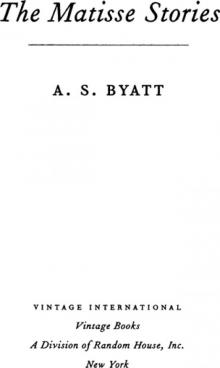 The Matisse Stories
The Matisse Stories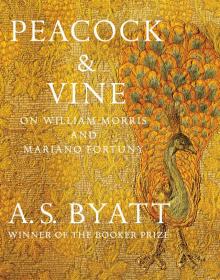 Peacock & Vine: On William Morris and Mariano Fortuny
Peacock & Vine: On William Morris and Mariano Fortuny Elementals: Stories of Fire and Ice
Elementals: Stories of Fire and Ice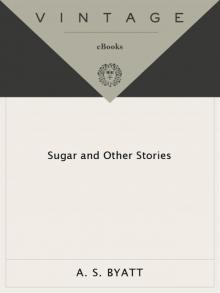 Sugar and Other Stories
Sugar and Other Stories Possession
Possession Little Black Book of Stories
Little Black Book of Stories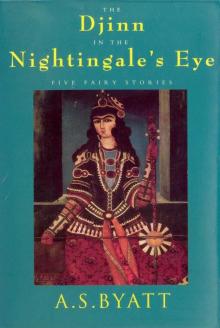 The Djinn in the Nightingale's Eye
The Djinn in the Nightingale's Eye The Virgin in the Garden
The Virgin in the Garden The Game
The Game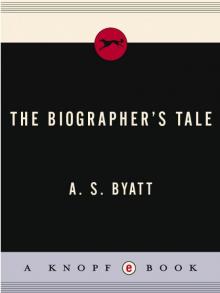 The Biographer's Tale
The Biographer's Tale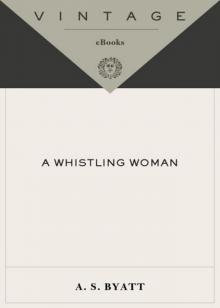 A Whistling Woman
A Whistling Woman Ragnarok
Ragnarok Angels & Insects: Two Novellas
Angels & Insects: Two Novellas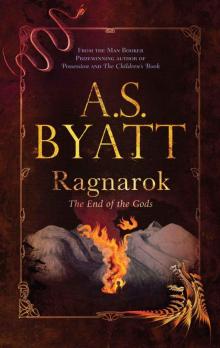 Ragnarok: the End of the Gods (Myths)
Ragnarok: the End of the Gods (Myths)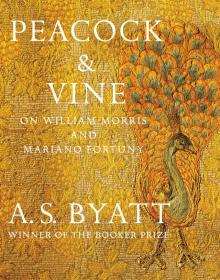 Peacock & Vine
Peacock & Vine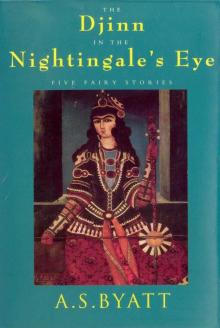 The Djinn in the Nightingale's Eye (Vintage International)
The Djinn in the Nightingale's Eye (Vintage International) Angels and Insects
Angels and Insects The Arabian Nights: Tales from a Thousand and One Nights (Modern Library Classics)
The Arabian Nights: Tales from a Thousand and One Nights (Modern Library Classics) Elementals
Elementals